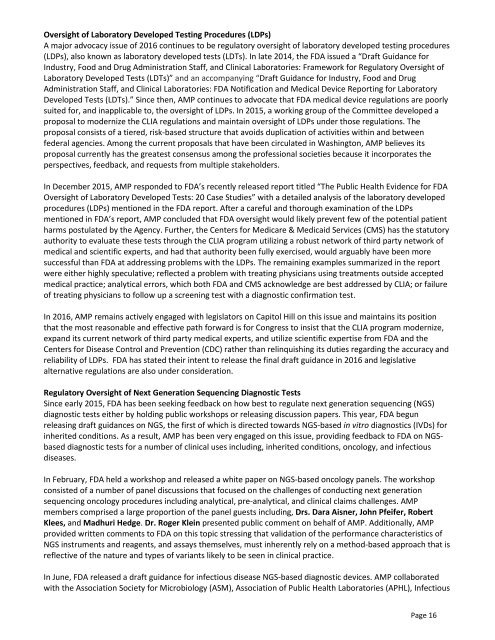AMP 2016 Committee and Subdivision Annual Reports
RiNx305S5yz
RiNx305S5yz
You also want an ePaper? Increase the reach of your titles
YUMPU automatically turns print PDFs into web optimized ePapers that Google loves.
Oversight of Laboratory Developed Testing Procedures (LDPs)<br />
A major advocacy issue of <strong>2016</strong> continues to be regulatory oversight of laboratory developed testing procedures<br />
(LDPs), also known as laboratory developed tests (LDTs). In late 2014, the FDA issued a “Draft Guidance for<br />
Industry, Food <strong>and</strong> Drug Administration Staff, <strong>and</strong> Clinical Laboratories: Framework for Regulatory Oversight of<br />
Laboratory Developed Tests (LDTs)” <strong>and</strong> an accompanying “Draft Guidance for Industry, Food <strong>and</strong> Drug<br />
Administration Staff, <strong>and</strong> Clinical Laboratories: FDA Notification <strong>and</strong> Medical Device Reporting for Laboratory<br />
Developed Tests (LDTs).” Since then, <strong>AMP</strong> continues to advocate that FDA medical device regulations are poorly<br />
suited for, <strong>and</strong> inapplicable to, the oversight of LDPs. In 2015, a working group of the <strong>Committee</strong> developed a<br />
proposal to modernize the CLIA regulations <strong>and</strong> maintain oversight of LDPs under those regulations. The<br />
proposal consists of a tiered, risk-based structure that avoids duplication of activities within <strong>and</strong> between<br />
federal agencies. Among the current proposals that have been circulated in Washington, <strong>AMP</strong> believes its<br />
proposal currently has the greatest consensus among the professional societies because it incorporates the<br />
perspectives, feedback, <strong>and</strong> requests from multiple stakeholders.<br />
In December 2015, <strong>AMP</strong> responded to FDA’s recently released report titled “The Public Health Evidence for FDA<br />
Oversight of Laboratory Developed Tests: 20 Case Studies” with a detailed analysis of the laboratory developed<br />
procedures (LDPs) mentioned in the FDA report. After a careful <strong>and</strong> thorough examination of the LDPs<br />
mentioned in FDA’s report, <strong>AMP</strong> concluded that FDA oversight would likely prevent few of the potential patient<br />
harms postulated by the Agency. Further, the Centers for Medicare & Medicaid Services (CMS) has the statutory<br />
authority to evaluate these tests through the CLIA program utilizing a robust network of third party network of<br />
medical <strong>and</strong> scientific experts, <strong>and</strong> had that authority been fully exercised, would arguably have been more<br />
successful than FDA at addressing problems with the LDPs. The remaining examples summarized in the report<br />
were either highly speculative; reflected a problem with treating physicians using treatments outside accepted<br />
medical practice; analytical errors, which both FDA <strong>and</strong> CMS acknowledge are best addressed by CLIA; or failure<br />
of treating physicians to follow up a screening test with a diagnostic confirmation test.<br />
In <strong>2016</strong>, <strong>AMP</strong> remains actively engaged with legislators on Capitol Hill on this issue <strong>and</strong> maintains its position<br />
that the most reasonable <strong>and</strong> effective path forward is for Congress to insist that the CLIA program modernize,<br />
exp<strong>and</strong> its current network of third party medical experts, <strong>and</strong> utilize scientific expertise from FDA <strong>and</strong> the<br />
Centers for Disease Control <strong>and</strong> Prevention (CDC) rather than relinquishing its duties regarding the accuracy <strong>and</strong><br />
reliability of LDPs. FDA has stated their intent to release the final draft guidance in <strong>2016</strong> <strong>and</strong> legislative<br />
alternative regulations are also under consideration.<br />
Regulatory Oversight of Next Generation Sequencing Diagnostic Tests<br />
Since early 2015, FDA has been seeking feedback on how best to regulate next generation sequencing (NGS)<br />
diagnostic tests either by holding public workshops or releasing discussion papers. This year, FDA begun<br />
releasing draft guidances on NGS, the first of which is directed towards NGS-based in vitro diagnostics (IVDs) for<br />
inherited conditions. As a result, <strong>AMP</strong> has been very engaged on this issue, providing feedback to FDA on NGSbased<br />
diagnostic tests for a number of clinical uses including, inherited conditions, oncology, <strong>and</strong> infectious<br />
diseases.<br />
In February, FDA held a workshop <strong>and</strong> released a white paper on NGS-based oncology panels. The workshop<br />
consisted of a number of panel discussions that focused on the challenges of conducting next generation<br />
sequencing oncology procedures including analytical, pre-analytical, <strong>and</strong> clinical claims challenges. <strong>AMP</strong><br />
members comprised a large proportion of the panel guests including, Drs. Dara Aisner, John Pfeifer, Robert<br />
Klees, <strong>and</strong> Madhuri Hedge. Dr. Roger Klein presented public comment on behalf of <strong>AMP</strong>. Additionally, <strong>AMP</strong><br />
provided written comments to FDA on this topic stressing that validation of the performance characteristics of<br />
NGS instruments <strong>and</strong> reagents, <strong>and</strong> assays themselves, must inherently rely on a method-based approach that is<br />
reflective of the nature <strong>and</strong> types of variants likely to be seen in clinical practice.<br />
In June, FDA released a draft guidance for infectious disease NGS-based diagnostic devices. <strong>AMP</strong> collaborated<br />
with the Association Society for Microbiology (ASM), Association of Public Health Laboratories (APHL), Infectious<br />
Page 16



